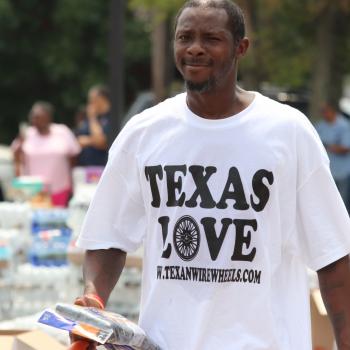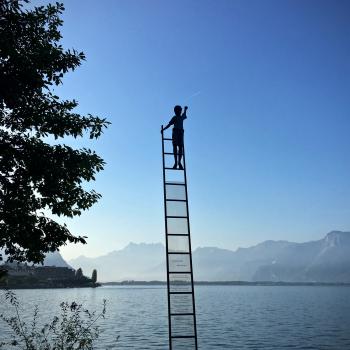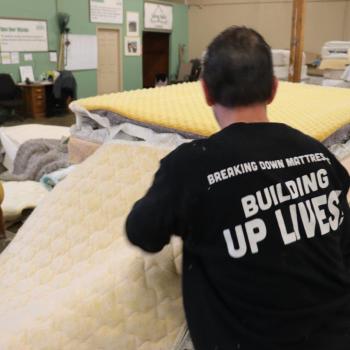We got there early, but not early enough. We were near the back looking at thousands of other heads in front of us.
It was going to be a long graduation ceremony. I could tell by the robed faculty members, led in by flags and a bagpipe player. And then the students rolled in, thousands of them it seemed.
I thumbed through the printed program, looking for names I knew and possibly some mental relief. No, none found. I started counting graduates, estimating the number of chairs and mutliplying by rows just for some mental relief. I stopped at 800 when the program started in earnest.
A beautiful rendition of the Star-Spangled Banner by the choir filled the area, bouncing off the nearby buildings creating a natural reverb.
Next up was the invocation. I wondered who would get the honor at this secular college. One of the fine area pastors? Or one of the stalwarts in the community? Or a firebrand social justice advocate? The guy who preaches on the sidewalk every day outside of the campus? None of these. The alloted time fell to the Master of Ceremonies.
She read from a prepared script, over-enunciating every syllable. With great flourish, encouraged all the attendees to “Pause and reflect, giving thanks for the graduates and hopes for their futures.”
The silence was no more than 30 seconds, but it seems that everyone respected it except for a cough over to the left, a child shrieking for a millisecond near the front.
And then the MC broke the silence. Not with an Amen, but a simple. “Okay.”
And then faculty stepped up, reading the long processing of names. At first I was offended at the short shrift given to prayer. But then I started thinking. When is the last time an invocation really moved me?
Invocations and controversy from Israel to Alaska
Just this week, Dallas Pastor Robert Jeffress was invited to lead the invocation at the opening of the U.S. Embassy in Jerusalem. The dedication is causing violence throughout the region, and the choice of Jeffries only added fuel to the fire. He hasn’t minced words about what he preaches about the destiny of Jews without Jesus – which isn’t exactly a popular message in Israel.
But the invocation these days is a constant cause of friction between secular and sacred.
An atheist gave an invocation in Oskaloosa, Iowa. And Florida. A secular humanist gave an invoation in Florida. There have been others controversial invocations given by witches, a Star Wars enthusiast, and those who simply want to mock the process.
In Alaska, the local Kenai Borough has been grappling with a resolution to remove the invocation from its meetings.
It all started when someone from the Church of Satan filled the role because it was first come, first serve on the sign-up sheet. Alarmed, a group of councilmen changed the rules so that the invocation duties would be better handled by the local ministerial council. The American Civil Liberties Union stepped in and called foul. So, then the council almost ditched the opening prayer – but voted 7-2 to keep it, Church of Satan prayers be damned.
The months long controversy brought out both sides. One side claimed, “there was no place for an invocation in government.”
The other said was fully entrenched. Such as Pamela Hall, who said, “Our country was founded as one nation under God. Ware not under God half of the time and one nation under Satan the other half.”
Eventually, they wondered if a moment of silence would be a compromise.
I’m kind of wondering if that’s not such a bad option after all.
Giving up on Invocations Doesn’t Mean Giving Up on God
I’ve thought about all the invocations I’ve been through. They are put into formal programs, duly inserted right after the national anthem.
It’s a tradition.
Maybe it’s a vain tradition.
Maybe it’s the kind of empty religious ritual that Jesus condemned.
I’ve led invocations myself. I’ve grappled with praying “in Jesus name,” and making the prayer broadly applicable. I’ve not always handled it well.
Rarely have I heard a heartfelt, sincere invocation. They are often written out, scripted to appeal to everyone and impress no one.
With great flourish, the invokers often sound like the Pharisee, calling attention to a god of love and hope and joy, but rarely the God of the Bible.
They are supposed to cause us to think about Divinity, to order our human business around his will. But too often, they are showcases for mediocrity and in today’s culture, invitations for mockery of God.
So maybe we shouldn’t be fighting for invocations so hard.
Is A Moment of Silence is a Good Compromise?
First, the Supreme Court has ruled that Invocations are legal, so let’s drop the “separation of church and state.” They don’t violate the separations clause.
But just because they are legal, are they profitable? And do they honor God?
I went to a church for a long time that incorporated silent prayers into the service. What often seemed an eternity probably never broke the 60 second mark. But they worked. Left alone with God, I had no other choice but to be honest, to be real.
If I had to depend on someone else to pray, I could lean on their words, their guidance. And I could skip talking to God altogether.
While I hurt for a world that is turning from God, neglecting Him for wisdom over city council meetings, over inaugurations, over graduations. We’ve silenced Him in our society.
And yet one-by-one, left to a moment of silence, a few of us might come face-to-face with God and start to listen.
So maybe a moment of silence isn’t such a bad thing.














